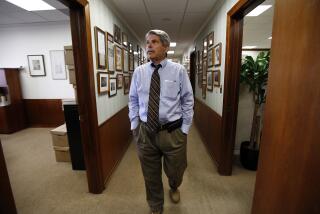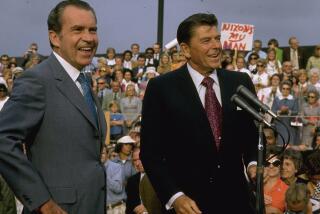The Life and Thought of Josiah Royce <i> by John Clendenning (University of Wisconsin: $27.50; 447 pp., illustrated)</i>
- Share via
Josiah Royce was once called “California’s gift to philosophy.” A famous American idealist, Royce taught at Harvard in the late 19th and early 20th centuries. The man and his views were later overshadowed by the fame of William James and pragmatism, but during his lifetime Royce was internationally acclaimed; he was the most influential philosopher of his era. In comparison to figures like James and John Dewey, Royce has been ignored by subsequent philosophers and historians. His arguments for absolute truth and the reality of an all-encompassing deity seem Victorian, while James and Dewey--who propounded relativistic theories of truth and who were more distanced from religion--appear in tune with the skepticism of the modern world. As this biography successfully shows, however, Royce was the decisive influence on the course of academic thought in the United States in the last 100 years.
Royce’s parents were Forty-Niners. He was born and reared in Grass Valley, Calif., and received an undergraduate degree from Berkeley, which had just opened its doors when he began study there in 1870. San Francisco businessmen provided the funds that sent him on a trip to the East Coast and on a year’s study in Germany. These were extraordinary opportunities for the son of a ne’er-do-well father who was a camp follower of the miners. Combined with Royce’s own genius, these opportunities eventually led him to an appointment in the philosophy department at Harvard, hailed at the time as the most formidable collection of thinkers ever assembled in the Western world.
Royce’s origins made a crucial impact on him. He had moved from an obscure mining camp to global professional prestige, and he felt isolated both in social situations and in his personal life. As many commentators have pointed out, however, the emphasis in Royce’s thought on the connection of the individual to the community arose from his experience of early California and its contrast to the cosmopolitan social order of Cambridge, Mass.
Royce’s intellectual debt to his birthplace was deep but ambiguous. Before his Harvard appointment, he taught at Berkeley for four years, from 1878 to 1882. He hated it, and thought he would grow “spiritually consumptive” in the speculative climate. “There is no philosophy in California,” he wrote. “From Siskiyou to Ft. Yuma, and from the Golden Gate to the summit of the Sierras there could not be found brains enough to accomplish the formation of a single respectable idea that was not manifest plagiarism.”
Yet Royce published a brilliant history of his native state, “California From the Conquest in 1846 to the Second Vigilance Committee in San Francisco,” which is still useful. He also wrote a series of essays on John Fremont that are exhaustive in their research, and a novel, “The Feud of Oakfield Creek,” based on the public concerns of his times in the far West.
John Clendenning, who is professor of English at California State University at Northridge, has written what will perhaps be the definitive study of Royce’s life and its link to his thought. Clendenning has diligently examined all available sources and tells Royce’s story clearly, even elegantly.
Clendenning is a good expositor of Royce’s thought. He slights, I think, the importance of logic to Royce, or at least is not able to join it cogently to Royce’s other ideas. In general, however, readers will welcome the succinct and comprehensive unraveling of many of the philosopher’s ideas.
Clendenning is one of the few historians of philosophy who believe that we must understand the thinker as well as the thought. Clendenning himself, one suspects from his text, is a bit of a romantic, and occasionally too easily engages in “psychologizing” Royce, at times rendering him a less complex man than he was. But overall, Clendenning sticks to the evidence and is not intrusive in his own judgments.
“The Life and Thought of Josiah Royce” is a serious book worth reading, especially if it leads to increased attention to this overlooked thinker himself.
More to Read
Sign up for our Book Club newsletter
Get the latest news, events and more from the Los Angeles Times Book Club, and help us get L.A. reading and talking.
You may occasionally receive promotional content from the Los Angeles Times.






